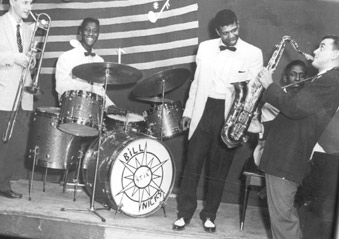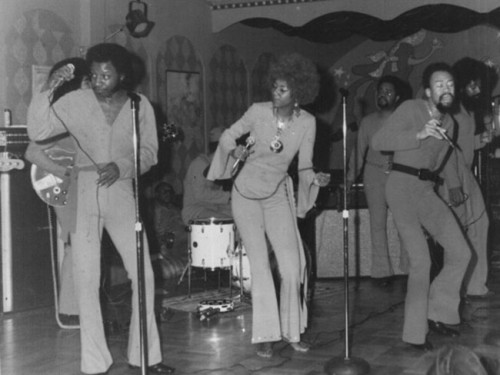by Sonya Bernard-Hollins, publisher
editor@comvoicesonline.com
*Header: Here I Stand: A Musical History of African Americans in Battle Creek, Michigan, is available at the Michigan News Agency in Kalamazoo, ABC Boutique in Battle Creek, Amazon.com, or by contacting: editor@comvoicesonline.com
Who do you know in your community who needs to be recognized for their role in history? Share their story with us! Send it to: editor@comvoicesonline.com.

BATTLE CREEK (MICH.)-When you talk about Michigan music history, many people around the world think of Motown in Detroit. However, there was a hot little club in Battle Creek, Michigan called the El Grotto Lounge where those such as Al Green, Jr. Walker and the All Stars, and many others got their start before fame. Did you know that the co-founder of Earth, Wind and Fire recorded his first hit “Here I Stand,” for VeeJay Records while he was still in high school at Battle Creek Central High School.
In 2003, I wrote a book called, “Here I Stand: A Musical History of African Americans in Battle Creek, Michigan.” In this book, I shared the exciting history of Battle Creek music. After talking to the musicians who lived in the heyday of the El Grotto Lounge (1960s) I discovered so many hidden gems. What I learned would keep me connected to this great group of guys for years to come.
It was Bobby Holley, “Mr. Entertainment,” who served as the catalyst for my interviews. He recalled how he was a young boy at the time his brother, Sonny Holley, joined Jr. Walker’s All Stars as its organ player. I was then told of the story of HOW the group came to Battle Creek from South Bend, Ind.

According to Victor Thomas (Walker’s first organists) the group toured places like South Bend, Benton Harbor, Battle Creek, and Albion, Michigan on weekend playing sprees. The group would pile into Walker’s (real name Aultry DeWalt) old Studebaker each weekend to play their gigs. One night, on the way to the El Grotto Lounge, their car broke down. Stranded on old 131, they made it to a payphone (yes, this was in the 1960s before cell phones) and called the club. Melvin Evans, the brother of owner Helen Montgomery, went to get the guys in time for their gig. It was then that Helen, and her husband, Snap, made a deal with Walker to relocate him to Battle Creek, and help him get a new car. Walker and the band accepted and it was at the club where their hit song, “Shotgun,” was created, impromptu.
The stories of these guys and others are amazing, and heartbreaking. Some, like Wade Flemons would learn the price of friendship and success when his group, the Newcomers, were phased out by VeeJay Records, to make Flemons a solo artists.
Al Green, who had relocated from the south the Grand Rapids, writes in his book, “Take Me to the River,” how the El Grotto was a training ground for his own style. He writes about how he (being underage at the time) would have to wait in the parking lot until it was his time to perform. He said he admired the showmanship of Jr. Walker and his band.
There is musical history even further back. Legendary Big Band composer, Melvin “Sy” Oliver was born in the city in 1910. He would later become a composer for big bands and even Frank Sinatra.
Writing this book has been bitter-sweet. On one hand, a reporter loves to uncover hidden history that educates and inspires others. However, since writing the book in 2003, many of the musicians I interviewed, including Vic Thomas, has passed away. Sonny Holley, who took his place (find out more details in the book) was honored by the City of Battle Creek with a key to the city for his role in music history. Lou Wilson, an original Newcomer with Wade Flemons, continued his blues singing career and was honored by the music community in Battle Creek for his classy and innovative style.
After years of interviews and research (many died before I could interview them) the men were honored with a free concert in Battle Creek in a collaboration with Heritage Battle Creek. The concert featured Motown artists, the Velvelettes, and The Contours (one of the original groups’ last appearance together) along with a variety of the local artists. It was a chance for the men to come together once more, to celebrate, and be recognized for their contribution to music.
Holley, who went on to have his own hit single, “Movin’ Dancer” summed up the entire affair like this: “Now I know, if I die tomorrow, when we die, someone will remember what we did in the music industry.
I thank for guys for allowing me to by nosy and look through their many photos and programs they had long tucked away. I realize many of the memories were not good. However, there were many joyful times in between. I thank them for allowing me to share it with the world.
